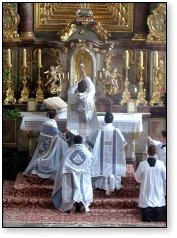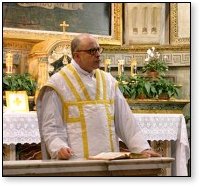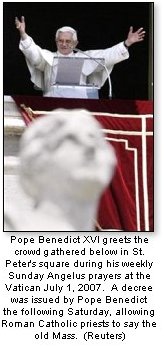 The Supreme Vicar of Christ on earth, Pope Benedict XVI, has recently spoken in a most wonderful way for the spiritual benefit of all the universal church, for the living and the dead, and for the memory of the victories of the Saints who have gone before us. [1]
The Supreme Vicar of Christ on earth, Pope Benedict XVI, has recently spoken in a most wonderful way for the spiritual benefit of all the universal church, for the living and the dead, and for the memory of the victories of the Saints who have gone before us. [1]
In releasing his Motu proprio, 'Summorum Pontificum,' on July 07, 2007, Pope Benedict XVI gave precise rules for the Catholic clergy and the faithful laity's wider access to the Traditional Latin Mass, without fear of stigma or marginalization. [2]
A great treasure of the Catholic Church, the Traditional Latin Mass draws the faithful out of their ordinary lives into the world of Christ. It promotes through its beautiful liturgy of prayers and postures the ultimate reverence of the faithful imbued with the sacred reality of Christ.[3]
Pope Benedict's Motu proprio allows any duly ordained priest who is 'worthy and not impeded by law' to celebrate the Tridentine Mass without permission from his bishop. Codified in the 16th century, the very reverent Traditional Latin Mass has been the Mass of the many Martyrs and Saints before us and delivered to us as a precious heritage. [4]
This Motu proprio or Apostolic Letter, published originally in Latin, makes it very clear that the Traditional Latin Mass was never abrogated and therefore the faithful may assist at it without any scruple of conscience. [5]
 Monsignor Ignacio Barreiro, S.T.D., Director of the Rome Office of Human Life International [Vita Umana Internazionale], a doctor of theology, civil lawyer, and author and writer, graciously spoke to us regarding the Pope's recent Motu proprio:
Monsignor Ignacio Barreiro, S.T.D., Director of the Rome Office of Human Life International [Vita Umana Internazionale], a doctor of theology, civil lawyer, and author and writer, graciously spoke to us regarding the Pope's recent Motu proprio:
Question: "Dear Monsignor, regarding the Motu proprio Summorum Pontificum's rights, are they given and taught infallibly, or would these rights within this teaching, be easy to derogate?"
Answer: "This Apostolic Letter is not a constitutive document, it does not create new rights, instead it is of a declarative nature recognizing the existence of previous rights, because the 1962 Missal, as the Holy Father notes in his introductory letter, "was never juridically abrogated and, consequently, in principle, was always permitted." What is new is the regulation of those rights, because all rights need to be exercised in a fashion regulated by the law in any well ordered society. The declarative nature of this document brings about two consequences:
"1. That the faithful that for many years we were supportive of the preservation of the classical liturgy of the Church we were never disobedient, but instead we were acting in accordance to an existing liturgy.
"2. The declarative nature of the Motu proprio leads me to believe that its basic historical affirmation cannot be changed by a future pontiff.
"At the same time it is evident that the legislative regulation of the exercise of these rights can be changed, which is the prerogative of the Pope as Supreme legislator of the Church. [6] That being stated, it is also evident that Summorum Pontificum in recognizing rights, creates a new juridical situation of acquired rights, so a move to negate those rights could be offensive to Divine and Natural Law."
Words cannot adequately express the joy — and the relief — that traditional Catholics the world over have experienced since Summorum Pontificum was publicly promulgated. Many Catholics around the world would like to express personally their profound gratitude to His Holiness Pope Benedict XVI for his recent 'mandate' setting free this Traditional Latin Mass. Fortunately, this opportunity has been made possible for each one of us. Let me explain.
 A Catholic couple living in New York City conceived an unusually beautiful idea. As a sign of gratitude and love, they reasoned, what could be better than to send a fresh bouquet of flowers, God's own artistry, to denote the accompanying gift of a spiritual bouquet — an offering of prayers — to the Holy Father? Since Pope Benedict left Rome shortly after the Motu proprio was publicly announced, they reasoned that the best way to accomplish this would be to have the flowers delivered to the Papal summer residence in the Cíttà dí Castel Gandolfo, just 30 miles outside of Rome, where the Pope will be residing from July 27 until mid-September. They enlisted the help of an American florist, From You Flowers, who arranged local florists in Italy to deliver our bouquets of flowers and bouquets of prayers to the Holy Father. Individuals and groups from all over the world can take part in this show of gratitude.
A Catholic couple living in New York City conceived an unusually beautiful idea. As a sign of gratitude and love, they reasoned, what could be better than to send a fresh bouquet of flowers, God's own artistry, to denote the accompanying gift of a spiritual bouquet — an offering of prayers — to the Holy Father? Since Pope Benedict left Rome shortly after the Motu proprio was publicly announced, they reasoned that the best way to accomplish this would be to have the flowers delivered to the Papal summer residence in the Cíttà dí Castel Gandolfo, just 30 miles outside of Rome, where the Pope will be residing from July 27 until mid-September. They enlisted the help of an American florist, From You Flowers, who arranged local florists in Italy to deliver our bouquets of flowers and bouquets of prayers to the Holy Father. Individuals and groups from all over the world can take part in this show of gratitude.
The New York couple contacted Monsignor Camille Perl, Secretary of the Pontifical Commission of Ecclesia Dei, who gave the project his blessing, noting that it would be "une belle surprise" for the Pontiff.
 To benefit from the special discounts offered by From You Flowers, we can call them at 1-800-838-8853 between the hours of 9 a.m. to 5 p.m. Eastern Time, Monday-Friday. We should ask for ext. 115. If calling outside those hours, we should ask for a supervisor and state we are interested in sending flowers to the Pope. It has been reported to this writer that already many groups and individuals have ordered these bouquets and are now being delivered to his summer residence.
To benefit from the special discounts offered by From You Flowers, we can call them at 1-800-838-8853 between the hours of 9 a.m. to 5 p.m. Eastern Time, Monday-Friday. We should ask for ext. 115. If calling outside those hours, we should ask for a supervisor and state we are interested in sending flowers to the Pope. It has been reported to this writer that already many groups and individuals have ordered these bouquets and are now being delivered to his summer residence.
From You Flowers will also attach a Spiritual Bouquet prayer card written in Italian to the flowers. We are to indicate to the operator how many prayers and/or Holy Masses we will offer for the Pope's intention.
This sounds like a wonderful project, designed to bring joy and encouragement to a spiritual leader who is regularly under siege. It is this writer's hope that a good number of souls will respond to this call, and join in a massive, collaborative voice to express their thanks, but especially their love, for the Holy Father in this beautiful way. Bouquets may be sent to either of the Holy Father's residences, Rome or Castel Gandolfo, depending upon where he is residing at the time. The florists will know where to deliver them for us.
NOTES:
[1] Council of Trent, Chapter II, "The Sacrifice of the Mass is Propitiatory Both for the Living and the Dead." Cf. Chapter VIII, "The Mass May not be Celebrated in the Vernacular. Its Mysteries to be Explained to the People."
[2] A Motu proprio is a papal act, a rescript, drawn up and issued by the Pope on his own initiative, without the advice of others, and personally signed by him. It is a document of the very highest authority. Motu proprio is Latin phrase meaning 'of his own accord.'
[3] "The Case for the Latin Mass," by Dietrich von Hildebrand, one of the world's most eminent Christian philosophers and called "The 20th Century Doctor of the Church," by Pope Pius XII.
[4] The accompanying 'Letter of Explanation' by Pope Benedict XVI can be found here.
[5] Priests and lay faithful may appeal to the Pontifical Commission Ecclesia Die in case of litigation or of the non-fulfillment of what is ordered in the Motu proprio. To do so, contact:
Dario Cardinal Castrillón Hoyos,
President of the Pontifical Commission 'Ecclesia Dei' Palazzo della Congregazione per la Dottrina della Fede Piazza del Sant' Uffizio, 11, 00l93 Rome, Italy, Europe.
Phone: 011.39.06.69.88.53.13or 011.39.06.69.88.84.94;
Fax: 011.39.06.69.88.34.12.
[6] Monsignor Barreiro explained further: "The right in itself to the traditional Mass I doubt that it can be derogated, but the way that this right might be exercised, that can be changed. To give you an example of legislation that can be changed is Art.5 of the Motu proprio."
© Barbara KralisThe views expressed by RenewAmerica columnists are their own and do not necessarily reflect the position of RenewAmerica or its affiliates.
